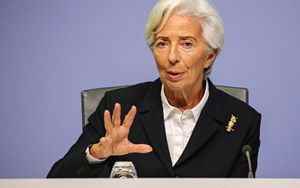(Finance) – The president of the European Central Bank, Christine Lagardehas ensured that the Frankfurt Institute will continue to insure the price stability as it has done for the past 20 years. “Compared to our expectations in December, the risks on the inflationary outlook increase”, he said at a hearing in the Economic and Monetary Affairs Committee in the European Parliament. According to the long-term indicators “theinflation it will return to 2% by 2023 and should remain around this level thereafter, “Lagarde said.” The outlook for inflation is uncertain, it is likely to remain elevated longer than previously expected, but will decline over the course of this year. year “, explained Lagarde,” i energy prices continue to be the main cause of the high rate of inflation “.
“In March the projections of the ECB experts will provide a assessment updatedtaking into account the most recent data “and this” will help the Governing Council to better evaluate the implications surprisingly high inflation figures for December and January for the medium-term outlook, “he added.
“There will be no increase in taxi before the end of ours shopping net of assets “, then assured the president of the ECB, underlining that” there are three conditions that must be met “before there is” sufficient confidence “that” a slope of our reference rate is appropriate. All three conditions are intended as safeguards against a premature rise in interest rates. “” Any adjustment to our policy will be gradual, “he added.
“Recent data confirm that the growth quarterly slowed to 0.3 per cent in the last quarter of 2021, which nevertheless allowed GDP to recover at pre-pandemic level. The moderate momentum of growth is mainly the result of the rapid spread of variant Omicron“, finally underlined Lagarde who nevertheless acknowledged that if on the one hand the uncertainties related to the pandemic” have slightly decreased, on the other “geopolitical tensions have increased and persistently high energy costs could exert a stronger brake than expected on consumption and investments “.
